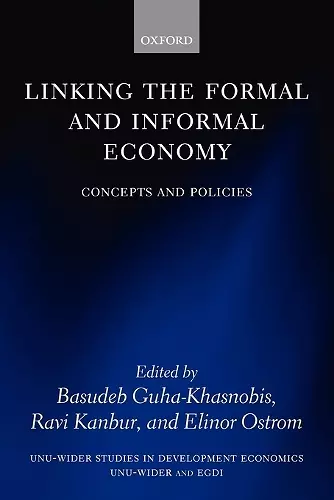Linking the Formal and Informal Economy
Concepts and Policies
Basudeb Guha-Khasnobis editor Ravi Kanbur editor The late Elinor Ostrom editor
Format:Paperback
Publisher:Oxford University Press
Published:20th Sep '07
Currently unavailable, and unfortunately no date known when it will be back
This paperback is available in another edition too:
- Hardback£145.00(9780199204762)

The concepts of formal and informal remain central to the theory and practice of development more than half a century after they were introduced into the debate. They help structure the way that statistical services collect data on the economies of developing countries, the development of theoretical and empirical analysis, and, most important, the formulation and implementation of policy. This volume brings together a significant new collection of studies on formality and informality in developing countries. The volume is multidisciplinary in nature, with contributions from anthropologists, economists, sociologists, and political scientists. It contains contributions from among the very best analysts in development studies. Between them the chapters argue for moving beyond the formal-informal dichotomy. Useful as it has proven to be, a more nuanced approach is needed in light of conceptual and empirical advances, and in light of the policy failures brought about by a characterization of the 'informal' as 'disorganized'. The wealth of empirical information in these studies, and in the literature more widely, can be used to develop guiding principles for intervention that are based on ground level reality.
Review from previous edition No matter how you divide up the developing world-'formal-informal', 'legal-extralegal' (my preference)- one thing is not debatable: most people are poor, on the outside of the system looking in, and getting angrier every day. The message of this book is it's time to stop talking and start designing reforms based on the informal practices and organizations that poor entrepreneurs already use. I second that motion. If you rebuild the system from the bottom-up, they will come, with their enterprise, creativity, and piles of potential capital. * Hernando de Soto, President, Institute for Liberty and Democracy, Peru *
The obvious is not necessarily the best. For many, a well-defined set of formal institutions is the obvious road to economic success. Academic analysts are attracted by the parsimony of formal institutions. Policy makers appreciate the apparent predictability of the effect on addressees. Constitutional lawyers prefer formal institutions since they lend themselves to ex post control. Yet as the book convincingly demonstrates, in many contexts, and in developing countries in particular, going for the obvious is bad policy. Imposing a small set of formal institutions forces all economic activity into a Procrustes' bed. Often, a clever mixture of formal and informal elements has two main advantages: harnessing new resources for corporate governance, and making the firm more responsive to its environment, be it demand, competition or regulatory expectations. * Christoph Engel, Max Planck Institute for Research on Collective Goods, Bonn *
Linking the Formal and Informal Economy is an excellent synthesis of past debates and contemporary policy analysis. It embraces economic development, governance and social justice issues and it provides innovative case studies from a wide variety of contexts. * Ray Bromley, State University of New York at Albany *
ISBN: 9780199237296
Dimensions: 234mm x 156mm x 16mm
Weight: 478g
312 pages